History
ㆍ
2020
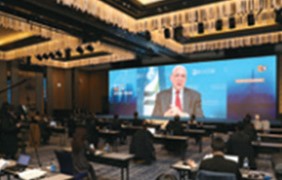
KDI's major research projects encompass comprehensive analyses and policy recommendations on stable macroeconomic policies in response to shifts in Korea's economy and society, and the wider global landscape; policy responses to structural reforms driven by digitalization, and changes in industry and the labor market; consolidating the role of government finance to protect vulnerable groups and enhance their quality of life; and strengthening the capabilities of the North Korea Policy and preparing for the establishment of a new economic community on the Korean Peninsula. Amid a rapid change in demographics, KDI's research is centered on studies that can support innovative economic solutions in order to tackle a wide array of new challenges that the world is sharing today, including digital transformation that are being catalized by COVID-19 pandemic as well as the restructuring of global economic order. KDI's research is trying to contribute to a sustainable growth with social inclusion.
- Korea's Road to an Innovation Economy: Enhancing Productivity through Structural Transformation and Institutional Reform Policy implications for Innovation-driven growth
- Structural Reform Measures in Response to Demographic Changes Enhances sustainable growth and improves quality of life
- Economic and Social Changes in the Post- COVID-19 Era and Policy ResponsesSeeking a future direction for Korean society by sector in the COVID-19 era
- Economic and Social Changes Driven by Digitalization and Response Strategy
- Effect of Greenhouse Gas Reduction Policy on Industrial Competitiveness
ㆍ
2010
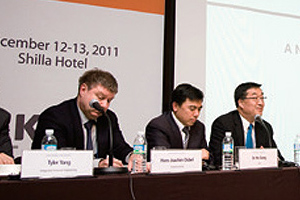
As the global economy becomes more integrated or intertwined, one nation’s economic risks tend to spread fast and widely at an unprecedented pace. Networks become more tightly connected, demanding a new economic development paradigm for co-existence and co-prosperity, not for individualistic survival. Now that the two rounds of global economic crisis stemming from the US and Southern Europe have increased uncertainties, both internally and externally, KDI has put in enormous efforts to find a new growth path and propose policy alternatives in advance which could help the Korean economy take a leading role in the post-crisis period. Furthermore, while strengthening its ability to respond to macroeconomic crisis, it also has worked to develop a future strategy that could actualize welfare society, balanced growth and economic democracy so as to build a robust economic structure. The institute has produced comprehensive studies based on its in-depth analyses on Korea’s economic, political, social and future conditions in order to find its new growth engine and solve pending problems, such as mounting household debts, increasing income insecurity among the low-income class and slowing potential growth resulting from population aging.
- Sustainable Development Goals in the Asian Landscape (Jun. 9)
- Concept Note on International Conference on More and Better Investment in Global Education (Jun. 14)
- Global Financial Stability Conference 2016 (Jul. 26)
- 2016 Knowledge Sharing Program Dissemination Seminar (Sep. 28)
- 2016 International Forum on the 4th Industrial Revolution and the Future of Industry (Dec. 1)
- [2015 KDI International Conference] Shifting the Paradigm for Sustainable Development: Eminent Domain and Property Rights (Mar. 4)
- [2015 ADB-KDI International Conference] Regional Financial Cooperation to Enhance Financial Resilience and Stability (May 26)
- 2015 Global Financial Stability Conference (Jun. 22~23)
- [KDI International Conference] Household Debt from an International Perspective: Issues and Policy Directions (Jul.10)
- 2014/15 Knowledge Sharing Program Dissemination Seminar (Aug. 26)
- [2015 International Forum on Service Sector Advancement] Dissemination of the Sharing Economy: Issues and Solutions (Nov. 18)
- Opening Ceremony of Sejong Complex (4.4)
- Opening of History Hall (4.4)
- Establishment of Center for Regulatory Studies (6.18)
- KDI School of Public Policy and Management's Relocation to Sejong Completed (12.23)
- Kim Joon-Kyung inaugurated as the 14th president (May 30)
- KDI-OECD Joint Conference on Korea’s Social Policy Challenges (Feb. 5)
- KDI Seminar with Speaker of the Lower House of the Parliament of Myanmar (Apr. 24)
- "KDI Policy Seminar: Policy Direction to Actualize the Creative Economy" (Apr. 29)
- Global Industry and Economy Forum 2013: Fostering Industrial Innovation through Creativity―Global Trends and Challenges for Economic Policy (Jun. 24)
- KDI-KLI-OECD Joint Conference on Strategies for a 70% Employment Rate (Jul. 4)
- KDI Seminar with Chairman of the National Assembly of Vietnam (Jul. 22)
- KDI Seminar with Speaker of the National Assembly of Pakistan (Oct. 23)
- KDI Seminar with Vice President of Cost Rica (Dec. 7)
- 2013 International Forum on Service Sector Advancement (Nov. 7)
- The 3rd National Economic Advisory Council meeting (Nov. 28)
- Relocation to the new KDI complex in Sejong city completed (Dec. 30)
- 「Global Korea 2012」, “Shared Growth: Toward a New Model of Capitalism after the Crisis” (Feb. 23)
- International Conference on "Korea’s Global Leadership: Accomplishments and Challenges" (May 8)
- International Conference on "‘Asian Perspectives on the Post-2015 Development Agenda: Taking Stock, Harnessing Knowledge and Achieving Results" (Jun. 12~13)
- Global Green Growth Summit 2011 "Building Planet-Responsible Civilization" (Jun. 20~21)
- MOSF-KDI International Conference on "The International Forum on the Service Sector Advancement" (Sep. 19)
- International Conference on "Enhancing Global Governance and Development and the Role of the G20" (Oct. 6)
- Conference in Commemoration of KDI′s 40th Anniversary: The Korean Economy in the Age of Democratization and Globalization: Accomplishments and Challenges (Oct. 24~25)
- International Conference on "A New Paradigm in Housing Policy" (Dec. 12~13)
- "The Service Sector Advancement: Issues and Implications for the Korean Economy" International Conference (Feb. 2)
- "Intellectual Property for Economic Development: Issues and Policy Implications" International Conference (Feb. 2)
- KDI-IMF Conference "Restructuring the World Economy" (Feb. 5)
- ASEM Forum 2010 "Green Growth and SMEs" (May. 7)
ㆍ
2000
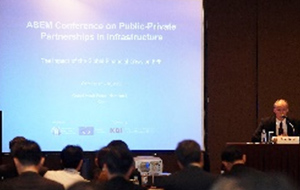
KDI has endeavored to introduce comprehensive mid- to long term policy measures to foster sustainable growth and at the same time, strengthen capabilities in microeconomic research, innovation and improving market structures. In addition, in order to incorporate economic efficiency and balanced distribution, KDI is working to strengthen fiscal productivity. Meanwhile, to approach socio-economic problems such as education and housing in an economic perspective, KDI strongly supports collaborative research with not only other research institutes in Korea but with international organizations such as the World Bank and OECD, thus internationalizing its research efforts.
In 2001, KDI conducted a collaborative study called Vision 2011 with 16 other research institutes, academic units and civic groups, which presented the challenges ahead for the Korean economy. What resulted was a publication entitled, Vision 2011: Open Society, Flexible Economy. In 2004, KDI published Dynamic Korea: a Nation on the Move, in light of the International Conference on New Vision and Strategy under Changing Leadership in Northeast Asia. Aims such as balanced growth and distribution, social cohesion, and voluntary participation are the underlying foundation for the new participatory government. This publication contains policy directions that will put Korea on the right track to establish an internationalized advanced economic system and to become an economic hub of Northeast Asia.
KDI will also focus its research capability on projects such as productivity of the public expenditure management system and a competitive financial services industry through the elimination of the gap between financial markets
- Vision 2011: Open Society, Flexible Economy
- Changes in Socio-Economic Conditions and Roles of Finance
- Policy Issues and Directions for Conglomerate Reform
- Development Directions for the Financial Industry
- A Study for North Korean Economic Development Strategy
- Comprehensive Study on Industrial Competitiveness of Korea
- Population Aging in Korea: Economic Impacts and Policy Issues
- Measures to Reform Financial Regulation and Supervision for Global Competition
- The Structural Change of Korean Economy and Job Creation
- Comprehensive Analysis on Private Tutoring Expenditure
- Analysis of Korean Housing Market and Its Policy Implications
- Protection Policy Direction and Goals for the Poverty-stricken Class
- Industrial Globalization in the 21st century(in English)
- Restructuring the Korean Financial Market in a Global Economy
- Reforming the Public Expenditure Management System: Medium-term Expenditure Framework, Performance Management, and Fiscal Transparency
- President Oh-Seok Hyun took office. (Mar. 24)
- Establishment of Center for International Development (CID) (Sep. 11)
- "International Conference on Social Enterprise 2009" (Mar.)
- World Bank Conference on Development Economics "Lessons from East Asia and the Global Financial Crisis" (Jun.)
- "Green Korea 2009" International Conference (Sep.)
- "ASEM Public-Private Partnerships in Infrastructure" International Conference (Oct.)
- "Regional Development Policy: International Experiences and Implications on Korea" International Conference (Jul. 15~16)
- "Growth and Structural Changes of the Korean Economy after the Crisis: Coping with the Rise of China" Open Forum (Jul. 21~22)
- "Academic Seminar on the 60 Years of the Korean Economy" (Aug. 20)
- "Community Capitalism Symposium 2008: Improvement Measures for the Role of Social Enterprises" (Nov. 14)
- "Financing Innovation-oriented Businesses to Promote Entrepreneurship" International Conference (Apr. 26~27)
- "Competition Policy in Regulated Sectors: Focusing on the Institutional Design of the Relationship between Competition Authority and Sectoral Regulators" International Conference (Jul. 10~11)
- "Market for Corporate Control: Comparative Perspectives" International Conference (Aug. 9~10)
- "A Decade-long Process of Overcoming the Financial Crisis and a Leap Forward" Open Forum (Nov. 29)
- "Regulatory Reform for Korea's Corporate Environment" International Conference (May 4)
- "Adopting Basel II: Impacts and Policy Responses" International Conference (Jul. 6~7)
- "FTA and Structural Changes:Experiences and Implications" International Conference (Sep. 14~15)
- "Vision 2030, Preliminary Forum on Future Growth and Welfare" (Sep. 28)
- "National Vision and Long-term Strategy Study: Approach Methods and Major Agendas "International Conference (Dec. 4~5)
- Integration of Private Infrastructure Investment Center of Korea (PICKO) with KDI to launch the public and Private Infrastructure Investment Management Center (PIMAC) (Jan. 27) - Act on Private Participation in Infrastructure revised, announced and take effect. (Law 7386)
- "2004 Annual Report" (Korea&English) published. (Jan.)
- A Study on Current Status and Policy Challenges of Economic Polarization
- "12 Ministry Open Forums on the National Fiscal Management Plan 2005~2009:
- Open Discussion with the Public on 5-year National Fiscal Management Plan"
- "KDI 34th Anniversary International Conference: Population Aging in Korea: Economic Impacts and Policy Issue" (Mar. 17~18)
- "Residential Welfare and Housing Policies: The Experience and Future of Korea" International Conference (Jun. 2~3)
- President Jung Taik Hyun took office. (Nov. 24)
- 1st National High School Student Scholastic Competition for Economic Studies (Feb. 7)
- "Vision and Agendas of Participatory Government's Socio-economic Policies: Korea's Dynamism and Opportunities" published. (Feb.)
- A Study on Economic Impacts and Reponses on Demographic Changes of Population Aging
- "International Conference to Commemorate the 1st Anniversary of Participatory Government: A New Vision and Strategy under Changing Leadership in Northeast Asia" (Feb. 27~28)
- "KDI 33rd Anniversary International Conference: Industrial Dynamism and Competitiveness in the East Asian Economies" (Apr. 22~23)
- A Study on the Economic Policy Direction to Prepare for Population Aging
- President Choongsoo Kim took office. (Aug. 7)
- "Exploring the Development Strategy for the North Korean Economy" published. (Dec.)
- President Bong-Kyun Kang took office. (Mar. 12)
- "International Seminar on Status and Prospects for Domestic and Foreign Corporate Restructuring Market" (Dec. 6)
- "Vision 2011: Open World, Flexible Economy" published. (Dec.)
- Establishment of the Public Investment Management Center (2000~04)
- "International Seminar on Accomplishments, Introspection, and Future Choices at Three Years After IMF Bailout" (Dec. 8)
ㆍ
1900
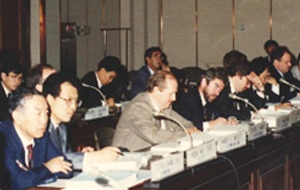
Under the newly-elected government, KDI took part in the seventh Five-year Plan in 1992, and began formulating the Five-year Plan for the New Economy in 1993. However, as this plan remained a tentative paper plan without a follow-up implementation framework, the series of Five-year Plans over the past several decades came to an end. For the second collaborative study with Harvard Institute of International Development (HIID), KDI conducted another study on Korea's economic growth experiences starting in the mid-1970's and published a three-volume series on Korea's socio-economic development process. To commemorate the 50th anniversary of Korea's Liberation, KDI published a research report both in Korean and English that covered all the major economic issues of Korea over the past five decades.
In the midst of worldwide globalization, the domestic financial sector was dealing with reform measures such as liberalization and financial market development. KDI continued studies in these topics and played a significant role in the activities of the Financial Reform Committee established in January 1997, and as an output the Committee published Report on Comprehensive Financial Reform in December 1997. Based on studies of these economic issues and experiences of long-term economic development plans, KDI published Comprehensive Measures for Overcoming Economic Crisis and Structural Reforms in April 1998, thereby providing various policy instruments for overcoming the economic crisis. In this study, critical issues and appropriate action plans for structural reforms were presented. In general, following the financial crisis, KDI's research topics have expanded to address a broader range of issues in the national economic system.
- Distribution Inequality and Major Policy Issues
- Economic Analysis of Korean Conglomerates
- Distortions in Industrial Protection and Inducement Measures
- Government Renovation: Strategy and Lessons from Advanced Countries
- Monetary Liberalization and Monetary Supervision
- Restructuring and Knowledge Intensification of Small & Medium Enterprises
- Development of SMEs & Venture Capital and Activation of Over-the-Counter Market
- Integrated Economic Strategy for Unified Korea
- Agriculture Renovation
- Development of Korea Financial Industry Structure
- Study on Employment Creation
- The Korean Crisis: Before and After(in English)
- Industrialization and State: The Kore an Heavy and Chemical Industry Drive(in English)
- KDI Charter ratified to Act on Foundation, Management, and Growth of Government-financed Research Institute (Jan. 29)
- 'KDI School of International Studies' changed to 'KDI School of Public Policy & Management' (Nov. 6)
- Launch of Monthly "KDI Review of the North Korean Economy" (Jan.)
- "International Conference to Commemorate the First Anniversary of the Launch of the Government of the People: Democracy and Market Economy" (Feb. 26~27)
- "DJnomics: A New Foundation for the Korean Economy" published. (Feb.)
- "International Forum on the Korea's Economic Crisis and Structural Reform Assessment at Two Years after IMF Bailout" (Dec. 3)
- "Paradigm of the New Millennium: Development Strategy for Knowledge-based Economy" published. (Dec.)
- President Jin-Soon Lee took office. (Mar. 11)
- Establishment of KDI School of International Studies (Mar.)
- 'Center for Economic Education,'changed to 'Center for Economic Information and Education,' and moved to KDI. (Sep.)
- "Financial and Corporate Restructuring and the Future of the Korean Industry" published. (May)
- "Comprehensive Measures to Handle the Economic Crisis and Restructuring" published. (Apr.)
- "Opening the Future with the National Public: Economy Blueprint by the Government of the People" published. (Aug.)
- Administration Office of the Financial Reform Committee installed and operated. (1997~98)
- "Synthesis Paper on Financial Reform" published. (Dec.)
- "National Agendas toward an Open Market Economy" published. (Sep.)
- 'Government Innovation: Strategy and Lessons of Advanced Economies" published. (Jan.)
- President Dong-Se Cha took office. (Mar. 11)
- Act on KDI amended establishing KDI Graduate School (No.5047) (Dec.)
- "A Half Century of the Korean Economy: Historical Evaluation and 21st Century Vision" published. (Dec.)
- Center for Legal and Economic Research installed and operated. (1994~95)
- A Study on the Maturation Process of the Korean Economy and Society. - 2nd HIID Joint Project (1994~97)
- President In-Jeong Hwang took office. (May 18)
- Supports to draw up the Five-year Plan for the New Economy
- President Hee-Yon Song took office. (Mar. 11)
- Integration of 'National Institute of Economic System and Information' with KDI (Law No.4446) -Establishment of Center for Economic Information (Dec. 27)
- "Basic Plan for the Development of the Inter-Korean Economic Cooperation" published. (Sep.)
- A Study on the Fair Trade Law and Policy
- A Study on Responses Related to Financial Liberalization and Openness (1991~97)
- North Korean Economy Research Council installed and operated. (1990~95)
- 7th Policy Council on the establishment of the Five-year Socio-economic Development
- Plan and its major policies (33 areas)
- Monthly "Narakyungje" published. (Dec.)
ㆍ
1980
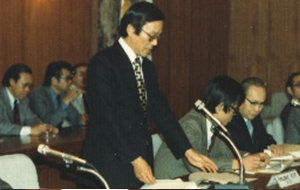
During the 1980's, KDI's research direction changed in response to the changes Korea was undergoing in its social and economic sectors. The concentration of economic power on business conglomerates intensified and its related problems expanded to become socio-political problems. This prompted researchers at KDI to identify the existing structural problems and respond with appropriate policy measures. These efforts formed the basis for the revision of the Fair Trade Act in 1986, which intended on establishing an appropriate legal system to reduce and deter economic concentration.
In response to increasing interest in social issues and related policies, KDI reviewed and studied ways to refurbish basic statistics over a wide range of areas including population, employment, culture, gender issues and the environment, thereby contributing to a significant expansion and improvement of the social index system. Regarding the National Pension System, KDI provided the basis for its introduction by providing an appropriate operational scheme, associated administrative structures, and by analyzing its socio-economic effect.
KDI initiated studies on the North Korean economy in order to correctly understand its economic situation and the prospects of economic cooperation between South and North Korea during the 1980's. On international trade policy, KDI pointed out that domestic protection measures through tariff and non-tariff barriers hampered international competitiveness of domestic industries, and proposed a reform of the tariff structure centered on a uniform tariff rate, as well as import liberalization.
For the agricultural sector, KDI proposed a non-farm income increase plan by forming Industrial Complexes in rural areas, thus establishing the basis for legislation of the Law on Farming & Fishing Households Development Promotion and the formation of nationwide rural industrial complexes.
As for public corporations, KDI studied issues related to enhancing their efficiency and privatization, which played important roles in the development and legislation of their management accountability system.
The long-term economic development of Korea has always been the main research concern of KDI. In 1985, KDI implemented a collaborative research project titled Prospects of the Korean Economy in 2000 with 11 other public research institutes. In 1988, KDI served as a steering research institute for the Economic Restructuring Consultative Council, a presidential.
- Analysis of Concentration in Korea' Manufacturing Industries
- Long-term Changes in Nominal and Effective Protection Rate Structure
- Comprehensive Measures for Non-farm Income Increase
- Fundamental Issues of Restructuring Industrial Policy and Support Policy
- Health Insurance Policy Issues and Its Development Path
- Wage Structure of Korea
- Status and Development Directions of Housing Finance
- Social Welfare Policy Issues and Its Development Path
- Changes in the Financial Environment and Status of Financed Firms
- Control of Korea' Public Corporations
- Social Development in Action(in English)
- Basic Plan for Economic Advancement" published. (Jan.)
- Secretariat of 'Presidential National Economic Advisory Council' installed and operated at KDI (1988~89)
- UN LINK Meeting hosted by KDI. (Oct.)
- President Bon-Ho Koo took office. (Jun. 3)
- "Improving the System for Korea's Social Indicators" published. (Oct.)
- President Yung Chul Park took office. (Oct. 18)
- A Study on the Introduction of National Pension (1986~89)
- 6th Policy Council on Five-year Socio-economic Development Plan (6 areas 28 policy agendas)
- Policy Councils on "Long-term National Development Plan for 2000"(11 areas) were held and published a synthesis paper. (Sep.)
- "Long-term Outlook for Labor Force Supply and Demand and Reponses" published. (Dec.)
- "Economic Assessment and Effect Analysis of Seoul Olympic Games" published. (Mar.)
- President Seung-Chul Ahn took office. (Nov. 7)
- Monthly "Major Indicators of the Korean Economy" published. (Mar.)
- Monthly "Major Indicators of the Foreign Economic Trends" published. (Apr.)
- President Ki-Hwan Kim took office (Jan. 20)
- Opening of the Korea Economic Institute (KEI) in Washington, US (May 6)
- Presidential Award for Merit Institutions concerning the 5th Five-year Economic Development Plan (Dec. 2)
- Installation and operation of the International Development Exchange Program (IDEP) (1982~2005)
- Quarterly "KDI Economic Outlook" published. (May)
- "Customs Policy Status and Reform Measures" published. (Jul.)
- A Study on Import Liberalization and Tariff Reform (1982~88)
- A Study on Increasing Farm Household Income (1982~83)
- A Study on Inter-Korean Economic Cooperation and Integration (1982~83)
- KDI President, Adjunct Director of the Korea International Economics Institute (KIEI) (Aug. 6~Oct. 15)
- 2nd Policy Council for formulating the 5th Five-year Economic Development Plan (26 task groups)
- 1st Policy Council for formulating the 5th Five-year Economic Development Plan (9 areas)
- A Study on Business Improvement of Public Enterprises
ㆍ
1970
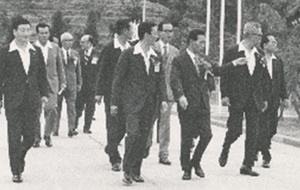
KDI was founded in 1971 in recognition of the need for a think tank that researches economic policy issues concerning Korea in both systematic and applicable ways, and assists the government in formulating the "Five-year Economic Development Plans" and related policies. KDI research fellows took part in the formulation and support of not only the five year plans but also the three-year rolling plans and yearly economic management plans. They also conducted short-term research projects to evaluate current economic policy issues and frequently held policy discussions and conferences. KDI also analyzed the long-term economic prospects for Korea and published its results in Long-term Socio-economic Development during 1977~91. Apart from its contribution to economic policy formulation, KDI also contributed to laying the foundation for economic research on Korea. In collaboration with the Harvard Institute of International Development (HIID), KDI studied 30 years of socio-economic development in Korea from its liberation in 1946 to the mid-1970's, and published the results in a ten-volume series in both Korean and English titled, The Economic and Social Modernization of the Republic of Korea. This comprehensive research study has become a valuable reference for economists, policymakers, and both domestic and foreign economic-related organizations.
KDI has continuously implemented extensive policy-oriented research in the areas of macroeconomics, public finance, monetary and financial economics, industrial organization and international trade, which are all directly related to economic development. In addition, social welfare issues, which have recently attracted considerable attention in Korea, were also analyzed by investigating valuable policy lessons from the experiences of advanced economies. Fundamental studies in social welfare systems such as health insurance, industrial accident insurance, pension and retirement funds, unemployment insurance, as well as studies and experimental research on income distribution topics, including absolute poverty, were performed. Social indicators used in advanced countries were modified to ensure their suitability in Korea by establishing appropriate definitions and measurement methods. This contributed to the publication of Korea's Social Index by the Division of Survey and Statistics of the Economic Planning Board.
- Study on Stability and Growth Policies
- Analysis of Agricultural Product Prices
- Labor Supply and Unemployment Structure
- Growth of the Korean Steel Industry
- Market Structure and Monopoly Control
- Growth and Structural Transformation
- Income Distribution and Its Determinants in Korea
- Health Finance and Its Determinants in Korea
- Study on Social Welfare Improvements
- Trade Distortions and Employment Growth in Korea(in English)
- The Economic and Social Modernization of the Republic of Korea(in English)
- Launch of the quarterly "Korea Development Review"(Mar.)
- Policy Council on Comprehensive Measures for Economic Stabilization (May 15)
- A Study on Income Distribution Issues (1978~79)
- "Long-term Socio-economic Development1977~91" published. (Dec.)
- Policy Council on the 4thFive-year Economic Development Plan (10 areas)
- Transportation, communications, land development, trade, international balance of payments, agricultural development, science & technology, technological industry, mobilization of domestic capital, energy, resources, social development, population, employment, education
- United Nations Fund for Population Activities (UNFPA), the Canadian International Development Research Centre (IDRC) and Population Association of America (PC) for funding the establishment and operation of "Population Secretariat" at KDI (1975~79)
- A Study on the Process of Modernization of the Korean Economy and Society (1975~78)
- Joint research with the Harvard Institute for International Development - A Study for the Development of Socio-economic Indicators (1975~79)
- Policy Council on the Basic Direction of the 4th Five-year Economic Development Plan (Dec. 26)
- "Basic Strategy for the 4th Five-year Economic Development Plan" published. (Dec.)
- President Park Chung Hee attended the opening ceremony of the main building of KDI. (Jul. 4)
- International Symposium Celebrating the Establishment of KDI (Jul. 5~6)
- Econometric models, productivity, industrial policy, international economy
- Promulgation of Presidential Decree on KDI (Presidential Decree No.5527) (Feb. 5)
- Establishment of KDI (Mar. 11)
- President Man-Je Kim took office (Mar. 11)
- Research Report, Vol. 1 "Opinions on Corporate Reorganization Plan" published. (Jun.)
- Promulgation of Act establishing KDI (Law No.2247) (Dec. 31)
We reject unauthorized collection of email addresses posted on our website by using email address collecting programs or other technical devices. To access the email address, please type in the characters exactly as they appear in the box below.
Please enter the security code to prevent unauthorized information collection.
